We’ve all heard how creative people try out new and exciting things and are always finding new possibilities or daydreaming about how they can make a difference. When you have a creative mind it helps bring you one step closer to achieving your goals as well. But creativity works in mysterious ways. Some people are born creative, while others learn to be creative.
Depending on the situation, creativity can come through inspirations and ideas which may appear out of nowhere and sometimes you fail to understand something trivial when you need it the most. And this is why thinking creatively necessitates a distinct thought process from the rest.
Creative people tend to see things in a slightly different light and whether they express it through quirky skills, art or thought, they stand out from the crowd. Even neuroscience confirms that such people think and act differently than the rest.
You can count on these 20 things highly creative people do differently.
“Curiosity about life in all of its aspects, I think, is still the secret of great creative people.” — Leo Burnett
20 Things highly creative people do differently
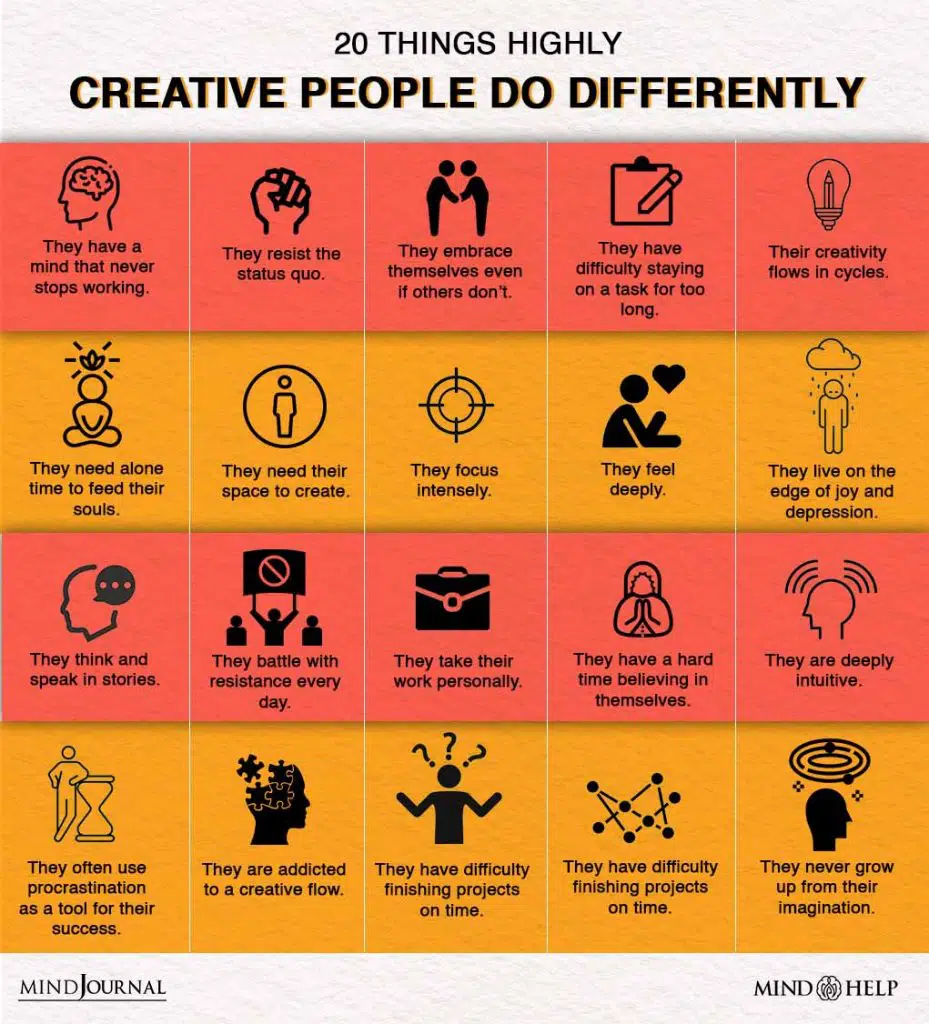
1. They have a mind that never stops working.
Creative people tend to have a mind that never slows down and they don’t like taking breaks from their thoughts. While an average person’s mind eventually stops thinking of ideas or possible outcomes after a point, creative people tend to dwell in their thoughts about the same thing over and over again.
This is also the reason why creative people tend to have trouble sleeping. So it’s true when they say creativity can strike at any moment, especially when you’re thinking about it. Many of the famous writers, musicians, and actors end up working during the late hours of the night. Could it be that their brains simply refuse to shut off?
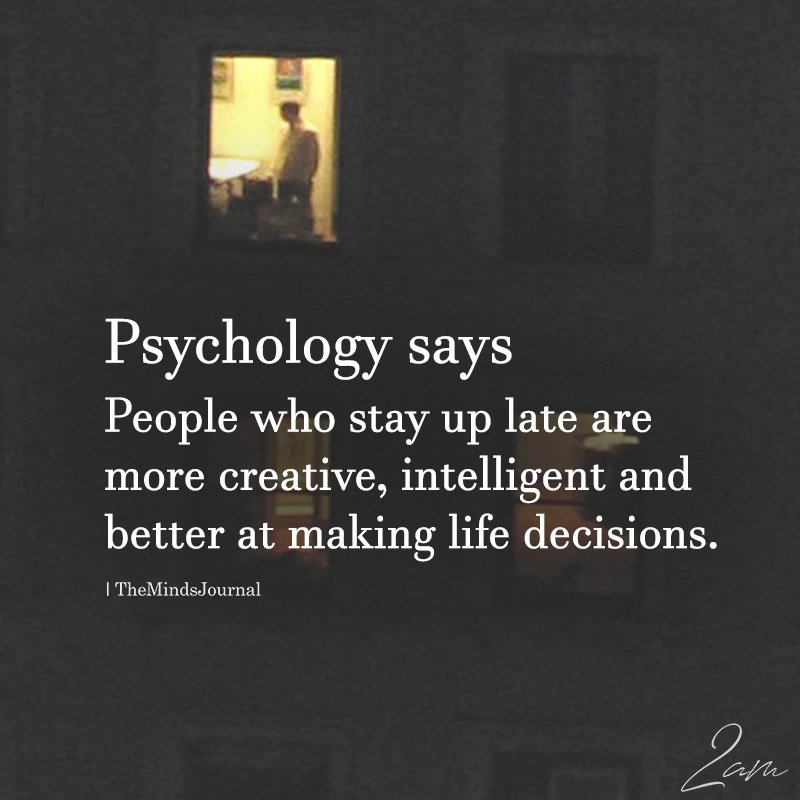
2. They resist the status quo.
Making things better by challenging them is what motivates creative people. As a result, every creative person has two types of questions running through their minds: “What if?” and “Why not?”
They question what everybody else takes for granted. While this may be unsettling for those around them, it is this ability that allows creative people to push the boundaries towards new possibilities.
They want to tell stories that people can relate to because their goal is to make a difference, not to argue. Seeing that there is some possibility of bringing about change with perseverance and knowledge, they go ahead with it with conviction and enthusiasm.
Read: The 3 Defining Qualities of Highly Creative People
3. They embrace themselves even if others don’t.
If there’s one thing that’s important to creative people it is self-expression. Creative individuals showcase their skills and ideas through their art or words. They would rather be authentic than popular.
They like staying true to who they are. They’d rather focus on what feeds their soul than chasing success or recognition. They don’t bother being misunderstood as long as they’re true to themselves.
4. They have difficulty staying on a task for too long.
Staying or focusing on a single task is something that creative people aren’t always aware of. Embarking on big mental breakthroughs and starting new things stimulates their minds.
When they begin a project if things become boring, they gradually lose interest, and if something exciting and new catches their attention, they become restless and shift their focus to the other objective. So if a task is tedious, it is most likely not their cup of tea.
5. Their creativity flows in cycles.
Creativity has a rhythm that is sometimes slow and sometimes frantic. Like any other natural cycle, creativity also goes through many stages of development. The increment, downturn, and thoughts that occur between the pauses are what appeals to them.
When creative people complain about a creative block, they are likely referring to the times when there is a slowdown in the process of their thoughts, so they rest to produce new ideas. It may appear that nothing is happening, but it is actually part of their creative flow.
Hence, the process of thinking and analyzing is important and cannot be avoided as it is required for them to find inspiration.
6. They need alone time to feed their souls.
Creative people frequently need to refresh their creative outlets and inspiration. This frequently requires periods of solitude and contemplation.
According to new research, travel can boost your creativity and improve your mind’s ability to generate positive thoughts, resulting in a happier, more inspired version of yourself. You may have noticed that most people go on solo trips or vacations to generate ideas and replenish their souls. For instance, famous writer Ernest Hemingway travelled to East Africa in search of inspiration for his short stories.
Shelley H. Carson, PhD, Psychology Prof. at Harvard University says, “Creative work allows us to stretch our mental comfort zones and view our surroundings and ourselves from new perspectives.”
So when creative people are exposed to new experiences, ideas flow and it allows them to be creative, broadening their perspective.
7. They need their space to create.
It is crucial to have the right environment to achieve creativity. It could be a studio, a cafe, or a peaceful corner of their home. Wherever they are, they will set these boundaries for their creative flow and expect others to respect them.
But space is more than just a physical concept; it also means solitude, giving yourself time to reflect, make new connections, and find meaning. They can enjoy and make productive use of their own company to stimulate creativity by tapping into thoughts and inner worlds.
8. They focus intensely.
Creative people know how to focus at the right moment. They do not multitask or take up too much work at once which can result in missing ideas. However, they aren’t completely unfocused, as it may risk not accomplishing many ideas.
They know the trick is to remain focused on their goals, but open to what exists outside of their initial ideas. It can take twenty minutes to refocus after being interrupted, even if the interruption was only twenty seconds. That’s why they tune the entire world out when they’re focused on work.
Read: 5 Simple Habits That Will Make You A Creative Genius
9. They feel deeply.
There are many cognitive and psychological benefits that have been linked to mindfulness. It is both a practice and a personality trait, including improved task concentration and attentiveness, empathy, self-reflection, enhanced memory, and improved learning. Many of these are essential to creative thinking.
Now creativity is all about expressing oneself and communicating deeply, through art, literature or thoughts. Creative people feel things more deeply than the average person. They have the ability to observe the present moment without distraction or judgement.
10. They live on the edge of joy and depression.
As highly creative people feel deeply, they can quickly shift from joy to sadness, and sometimes even depression. While their sensitive heart is the source of their creativity, it is also the source of their pain.
Grief, struggle, sorrow, and failure can all serve as powerful catalysts for personal growth, creativity, and profound transformation. We often learn compassion through suffering, understanding through loss, and discovering our strength and beauty by overcoming challenges.
11. They think and speak in stories.
“Storytelling is the most powerful way to put ideas into the world today.” — Robert McKee
Facts will never move the human heart in the same way that storytelling can. Highly creative people, particularly artists, understand this and incorporate stories into everything they do. It helps in the formation of imagination and confidence.
The more they share, the more they can learn from other people’s ideas. This enables them to determine which styles work and which do not. It also takes them longer to explain something because explaining isn’t the point; understanding the experience is.
12. They battle with resistance every day.
Steven Pressfield, writes: “Most of us have two lives. The life we live, and the unlived life within us. Between the two stands Resistance.”
Every morning, highly creative people are acutely aware of the need to grow and push themselves. However, there is always the worry that they lack the necessary skills. That fear will never go away, no matter how talented the person is. They simply learn to live with it or find ways to cope with it.
13. They take their work personally.
Creative work is an unfiltered expression of the creator and they frequently are unable to separate themselves from it.
It is true they take their work personally as they devote a significant amount of time to training themselves, seeking inspiration, jotting down ideas, and have high hopes or expectations from the quality of their work.
As a result, every criticism is interpreted as either an approval or disapproval of their self-worth.
Read: 5 Things That Differentiate A Genius From Ordinary People
14. They have a hard time believing in themselves.
The most creative people are not typically representations of self-esteem. They may be self-assured, successful, and even ambitious, but they are known to struggle with insecurity throughout their lives.
A creative person frequently wonders, “Am I good enough?” They constantly compare their work to that of others and fail to recognise their own brilliance, which is noticeable to others.
15. They are deeply intuitive.
Science is still unable to explain how and why people are creative. Nonetheless, creative people know instinctively how to create a flow of their thoughts time and again. They will tell you that it can only be understood through firsthand experience which is by observation and intuition.
Intuition arises from the unconscious or spontaneous knowledge, which is the key to their creativity, and it plays an important role in how they think, reason, create and behave socially.
Read: 10 Things Highly Intuitive People Do Differently
16. They often use procrastination as a tool for their success.
Psychologists agree with scientific evidence that creative ideas are much more likely to occur after a period of “incubation” wherein you focus on something completely unrelated to the task at hand while your brain is working behind the scenes.
Incubation could perhaps allow you to broaden your concentration, allowing you to make connections and return to the problem with a fresh perspective.
Creative people perform their best work under extreme pressure. They procrastinate subconsciously, and sometimes intentionally, postpone their work until the very last minute to feel the rush of the challenge, and work better under pressure.
17. They are addicted to a creative flow.
According to recent neuroscience findings, “the flow state” is perhaps the most addictive experience one can witness and creative people are addicted to the rush of creating that flow.
They want to seek the truth and are motivated when they engage with ideas, aesthetics, art and absorption in beauty or when they discover the depths of human emotion.
According to research, the desire to learn and discover appears to have a far greater impact on the quality of creative work than intellect alone. So, if you want to enhance your creativity, try a new creative outlet or an entirely different medium of expression.
18. They have difficulty finishing projects on time.
The early stages of the creative process are frenetic and exciting. With new ideas and a new mindset, creative people get off to a good start. However, they lose interest when the task becomes tedious.
They frequently abandon projects that are too familiar to encounter the initial flow that comes at the start and therefore have a difficult time completing them on time.
19. They connect dots better than anyone else.
Creative people not only generate new ideas but also take action to promote them. They are individuals who stand out and speak out. Their desire for creativity and the ability to notice things that the average person does not notice can change the world.
According to Steve Jobs, it is little more than connecting the dots. It is recognising patterns before they become obvious to others.
20. They never grow up from their imagination.
If you see through the eyes of a child you will never lose a sense of wonder. For creative people, life is all about mystery and adventure, when we say they never grow up we mean that they never forget how to live their lives with imagination.
Most people tend to lose their creativity when they grow older and simply exist, they are not truly living. Creative people never stop visualising, analysing and following their inner voice.
Wrapping up
Following all of these routes to becoming a highly creative person does not necessarily mean you will become a creative genius. But, whatever kind of work you may engage in will help you to be a deeply focused, inventive, daring and self-expressive individual.
We hope that more and more creative minds are created to make this world a better place. Let us know your thoughts in the comments below.
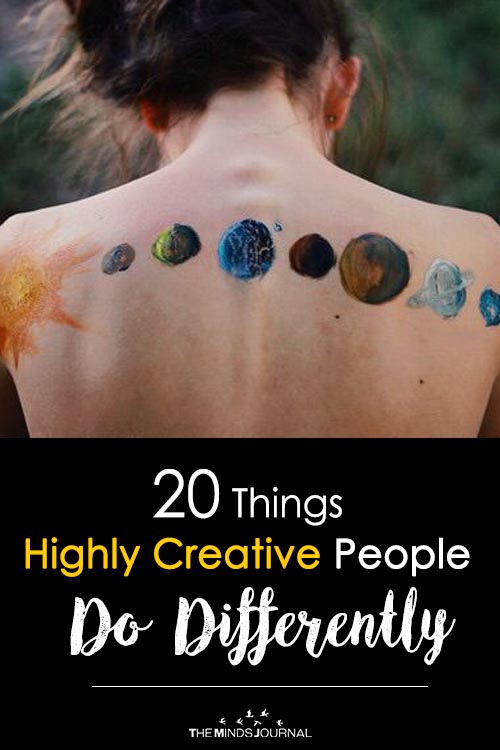
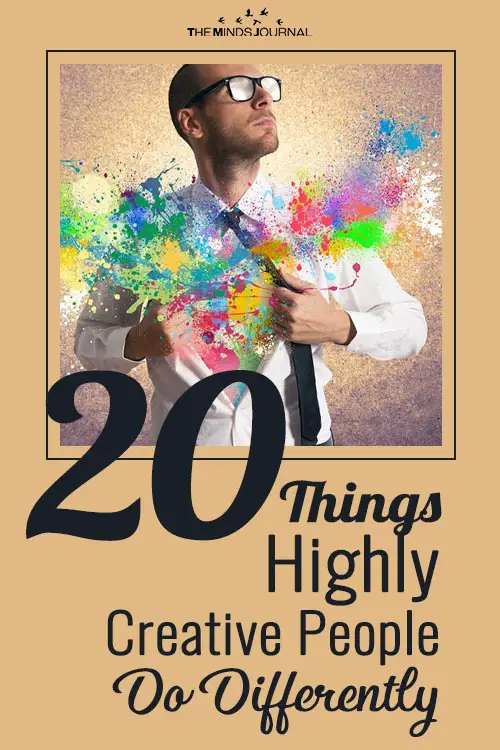
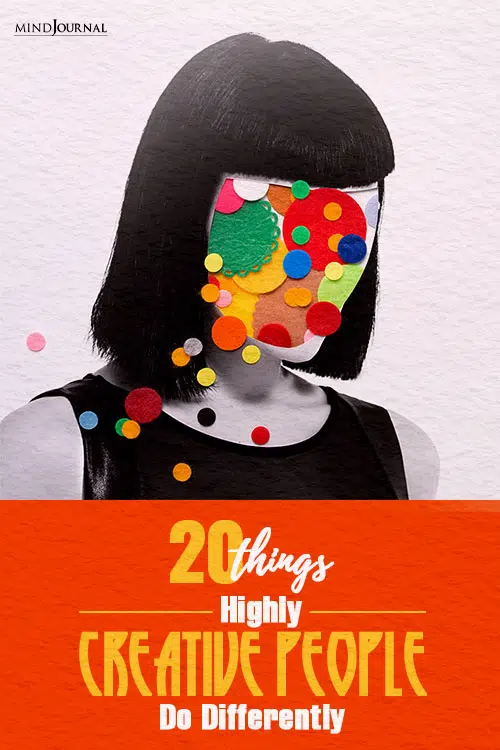
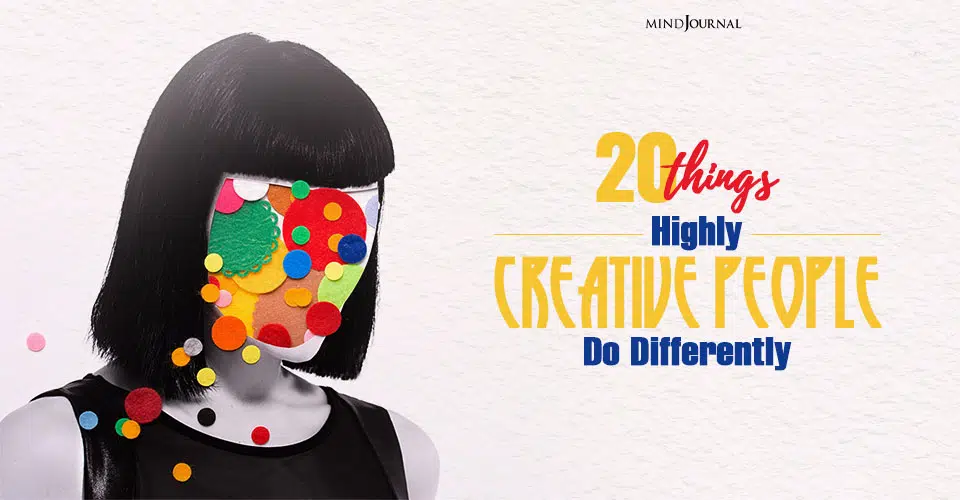







Leave a Reply
You must be logged in to post a comment.